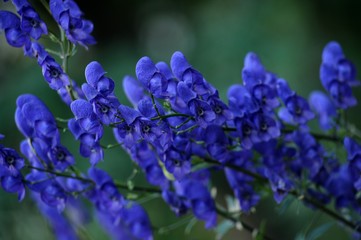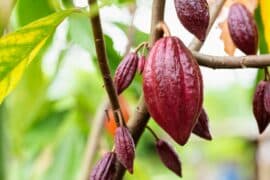Aconite
(Aconitum fischeri)

Description
Aconitum napellus, monk's-hood, aconite or wolfsbane, is a species of highly toxic flowering plant in the genus Aconitum of the family Ranunculaceae, native and endemic to western and central Europe. It is an herbaceous perennial plant growing to 1 m (3 ft 3 in) tall, with hairless stems and leaves. The leaves are rounded, 5–10 cm (2.0–3.9 in) diameter, palmately divided into five to seven deeply lobed segments. The flowers are dark purple to bluish-purple, narrow oblong helmet-shaped, 1–2 cm (0.39–0.79 in) tall. Plants native to Asia and North America formerly listed as A. napellus are now regarded as separate species. The plant is extremely poisonous in both ingestion and body contact. Aconitum napellus is grown in gardens in temperate zones for its spiky inflorescences that are showy in early-mid summer, and its attractive foliage. There are white and rose colored forms in cultivation too. The cultivar 'Spark's Variety' has gained the Royal Horticultural Society's Award of Garden Merit. Aconitum napellus is grown in gardens for its attractive spike-like inflorescences and showy blue flowers. It is a cut flower crop used for fresh cutting material and sometimes used as dried material. The species has a low natural propagation rate under cultivation and is propagated by seed or by removing offsets that are generated each year from the rootstocks. The use of micropropagation protocols has been studied. This species has been crossed with other Aconitums to produce attractive hybrids for garden use, including Aconitum × cammarum. Like other species in the genus, A. napellus contains several poisonous compounds, including enough cardiac poison that it was used on spears and arrows for hunting and battle in ancient times. Persian physician Avicenna (980–1037) wrote that arrows dipped in the sap were used to kill, and Dr Antonio Guaineri, in one of the first medical dictionaries 'Practica', wrote that arrows that had the poison from roots of the plant were used to kill wild goats in Italy. A. napellus has a long history of use as a poison, with cases going back thousands of years. During the ancient Roman period of European history, the plant was often used to eliminate criminals and enemies, and by the end of the period it was banned and anyone growing A. napellus could have been legally sentenced to death.
Taxonomic tree:







